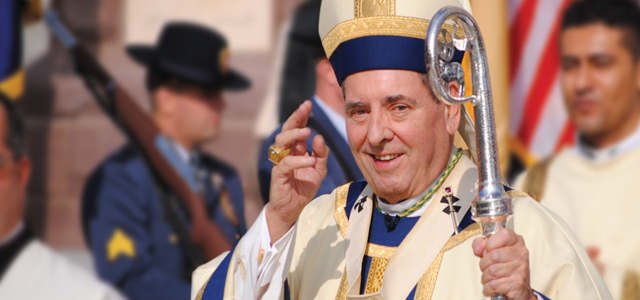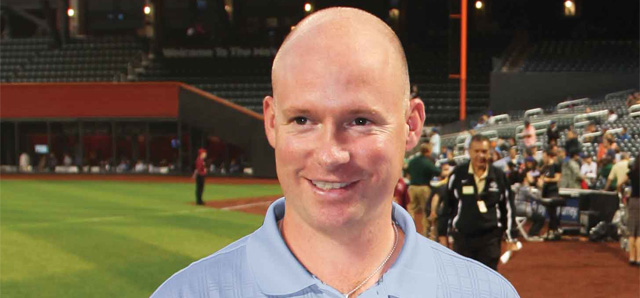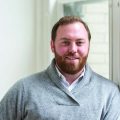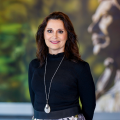Outside Archbishop John Joseph Myers’ office in the archdiocesan center in Newark hangs a parchment, similar to a family tree, which traces in elegant calligraphy his episcopacy back through time to the 16th century and a diocese in southern Italy.
The ecclesial roots and faith of the 71-year-old prelate run as deep as the sensibilities that come from growing up with six siblings on a farm in Earlville, Ill., where childhood friend Gary K. Wolf said the town of 1,400 instilled in Myers a Midwestern ethic.
“He has a deft touch with people,” said Wolf, who delivered milk with Myers and his father every summer morning during their high school years. “It was no surprise to me that he wanted to be a priest.”
Myers, who serves as chairman of Seton Hall’s board of trustees and president of the board of regents, celebrated his silver jubilee as a bishop on Sept. 3, 2012.
As “a Vatican II priest,” he said, the pastoral character of the 1962-1965 ecumenical council, plus “my own Midwest approach,” are at the heart of his 25 years as a bishop.
“Clearly proclaiming the Gospel and the faith of the Church and inviting people into it — that is my deep conviction of what we should be doing,” he said.
“Archbishop Myers faithfully and steadfastly carries out the ministry of teaching, leading and sanctifying as a successor to the apostles,” said Cardinal Donald Wuerl, Archbishop of Washington, D.C. He befriended Myers in 1963 en route to Rome where they studied at the Pontifical North American College, and was ordained a priest with him three years later in St. Peter’s Basilica.
Myers has “never been one to seek the spotlight, and generally seems more comfortable behind the scenes,” said John Allen, senior correspondent for the National Catholic Reporter. “But he is a figure that other bishops respect, both for his expertise in canon law and for his personal integrity.”
Myers said his passion for sharing the Catholic faith — particularly with the young — was a priority he set during his first assignment after returning from Rome, where he had studied theology for four years. As an assistant pastor at Holy Family Parish in Peoria, Ill., he taught religion in the high school and also conducted regular study sessions with adults. (Now, as archbishop, he frequently has free-wheeling online Skype sessions on religion with high school students.)
Ray LaHood, a former Congressman and now U.S. secretary of transportation, taught science, geography and civics to sixth, seventh and eighth graders at the Holy Family school at that time. LaHood was impressed by young Father Myers’ enthusiasm.
“He was a huge, huge believer in Catholic schools, which is one of the reasons he came over to teach, to ensure that children understood the doctrines of the Church — and the best way to hear it was from a priest,” LaHood said. “That’s a big commitment in a busy parish.”
Myers’ commitment has only grown since 2001; his ministry embraces more than 1.3 million Catholics in the 220 parishes that make up the Archdiocese of Newark, which includes Seton Hall, the nation’s oldest and largest diocesan university.
Myers is the fifth Newark archbishop to oversee the University as chairman of its board of trustees and president of the board of regents. He said these posts are important to his teaching ministry as the head of one of the largest and most ethnically diverse dioceses in the U.S.
“I have worked quietly with the officials of the University to make its Catholic identity even more pronounced and clear,” he said.
A 1963 graduate of Loras College in Dubuque, Iowa, another diocesan college, Myers said he knows the impact a Catholic college education can have in the life of a young adult — especially now.
Myers said he consistently encounters young people “yearning to hear the straight teaching of the Church. They don’t want someone’s opinion, some theological yarn. They want to know what the Gospel says and what the Church understands and teaches about it.” Priests are vital to that task. “To build their Catholic identity, kids have to have contact with priests,” Myers said, which is why his priorities at Seton Hall have included expanding Campus Ministry and maintaining the assignments of 47 diocesan priests to the University — a number he said few other institutions could match. The priests serve as administrators and teach an array of courses, in addition to religion.
Meanwhile, all undergraduates are exposed to the Catholic intellectual tradition through the University’s core curriculum. The Class of 2012 was the first to complete all three signature courses, initiated in 2008, that aim to foster habits of servant leadership. The courses have the academic breadth “to accommodate the various ethnic groups and faiths” within Seton Hall’s diverse student body, Myers said.
Exposure to Catholic programs on campus helps fill gaps in the way religion has been taught since Vatican II, which Myers observed firsthand as a student in Rome. Returning to the U.S., where he studied canon law at Catholic University, he was surprised at how the work of the world’s bishops was misinterpreted.
“Everyone was tumbling over one another trying to be the most avant-garde,” he said. “They lost it catechetically and, as a result, we’re facing about two generations of parents who can’t talk well about the faith.”
A Catholic college can remedy that with students ready to take charge of their futures by reviving faith and providing a solid platform for Catholic adulthood and family life, Myers said.
Recalling that Pope Benedict XVI called for a New Evangelization that “re-proposes Christ,” especially to young people, Wuerl praised Myers for giving so much attention to that charge.
Yet he does so as “a spiritual leader,” President A. Gabriel Esteban said, explaining that the core curriculum took several years to develop and implement.
“In theory, His Grace could have said, ‘do it tomorrow,’ ” Esteban said. “But he is very aware of the principle of shared governance in a university setting, and so Archbishop Myers encourages us to explore ways to strengthen our Catholic mission and identity by leading more by example. He is easy to work with.”
“From day one, Archbishop Myers has made the well-being of Seton Hall a top priority,” said Monsignor Anthony Ziccardi, vice president for mission and ministry. “He has expertly assisted the trustees, regents, and senior administration to appreciate better Seton Hall’s distinctive identity and to be more faithful to its Catholic mission and to leverage both of these for its immediate and long-term success.”
Myers said, “I take time consulting and getting people involved.”
As he marks his 25 years as a bishop, Myers remembers how he was once certain his priestly ministry would be carried out in a parish or a seminary classroom. Then came the surprise call in 1987 from the Apostolic Nuncio (the Vatican’s embassy in Washington) informing him Pope John Paul II had named him a bishop.
Although he had been working in the chancery in Peoria after serving six years in two parishes, he said he was shocked when told he was being named coadjutor, which meant he would succeed Bishop Edward O’Rourke after he stepped down in 1989.
After serving the Peoria diocese’s 235,000 Catholics and 157 parishes for 12 years, Myers said he was surprised again in 2001 when told the Holy Father had appointed him archbishop of Newark. “New Jersey?”
he responded incredulously, noting it was unusual at the time for a bishop from the Midwest to receive an appointment in the East.
Since, he has come to appreciate the beauty of the state, especially rural sections like Hunterdon County, where he maintains a retreat, because they remind
him so much of the Midwest. “I consider myself a New Jerseyan now,” he said.
Like many of his peers, Myers has had to confront school closings and parish consolidations and the sexual abuse scandals that have rocked the Church.
“John has a tough job and has to make really, really hard decisions but he always tries to do it in a fair and equitable way,” said Wolf, an author best known as the creator of Roger Rabbit.
“I’d call it the Midwestern ethic,” said Wolf, with whom Myers co-authored Space Vulture, a science-fiction novel. “We grew up in a very small farm town believing you had to work for what you got. You didn’t lie, you didn’t cheat, you didn’t steal. You worked to better yourself.”
“What carries him are his very strong Midwestern values,” LaHood agreed, adding that it was Myers’ collegial approach — and his love and eagerness to promote the Catholic faith — that convinced everyone he was destined to ascend the hierarchy.
“I was never daunted,” Myers said. “As the eldest of seven, I think my parents managed to give all of us an adequate self-image. So, while I recognize difficulties in situations and my own unworthiness, when asked to do something, I just get ready, organize and go at it.”
— Al Frank ‘72/M.A. ’10 is an adjunct professor and a writer based in Parsippany, N.J.







